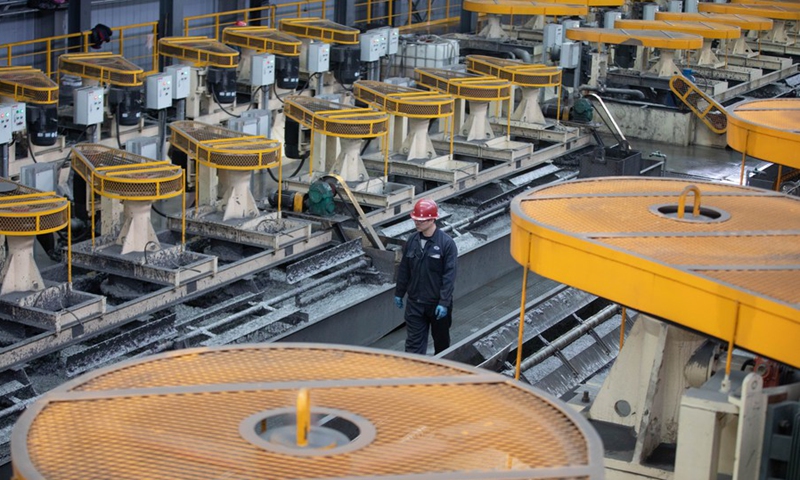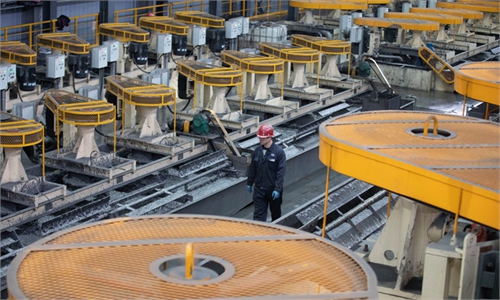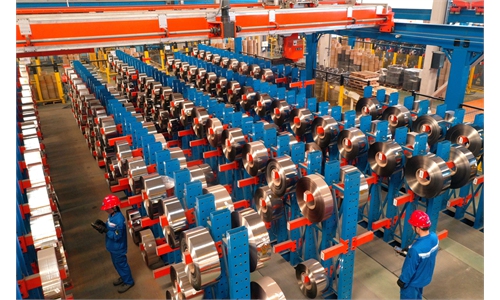China's export controls on graphite to take effect from Friday; application channels for firms open: officials
Move aims to protect national security; channels for application open

A man works in a workshop of a graphite company in Jixi City, northeast China's Heilongjiang Province, March 24, 2023. Photo: Xinhua
China's move to impose export controls on certain highly sensitive graphite items has put many in the West on notice, with officials and companies in countries such as the US and Japan scrambling to gauge the potential impact. The control measures are set to take effect on Friday.
Chinese officials reiterated on Thursday that these export controls don't target any specific country but are in line with international norms and are intended to protect China's national security and interests.
They also noted that channels for export applications are open and applications will be approved if they are in line with the laws and rules, and China will continue its commitment to protecting the stability of global industry chains.
In October, China's General Administration of Customs and the Ministry of Commerce (MOFCOM) jointly issued a notice imposing export controls on certain highly sensitive graphite items, a key material used in batteries for electric vehicles.
Under the new measures, China will require exporters to apply for permits covering certain highly sensitive graphite items, effective from Friday.
As the effective date has come, foreign institutions are scrambling to gauge the potential impact, and there are some who have hyped that China's export rules on these materials may disrupt the global industry chain.
A Washington Post report on Wednesday said that the move means a "new front that has opened in the intensifying US-China tech war," and it claimed that China's export controls are "payback for Washington's efforts to curtail Chinese access to advanced American semiconductors."
Japanese companies are also nervous. A Nikkei Asia report said on Thursday that Japanese companies, including Mitsubishi Chemical and Panasonic, which have relied on critical battery and semiconductor materials made in China, are moving to "broaden their sources."
"We have emphasized multiple times that implementing export controls on specific graphite items is a common international practice," Shu Jueting, a MOFCOM spokesperson, told a regular press conference in Beijing on Thursday.
Shu noted that the decision was made after "extensive consultation with relevant enterprises and industries," with a "balanced development and security" control concept.
Shu emphasized that the measure does not target any specific country or region. Export permits will be granted for items that comply with the relevant regulations. But as of now, no applications from enterprises have been received.
"China will consistently strive to uphold the security and stability of global industry and supply chains," Shu said.
"Almost all countries impose export controls on key materials, and China's move is not an outright ban but rather a regulation of exports, in stark contrast to Western countries' blatant actions of restricting exports of chips and other items to China," Zhang Hong, a Beijing-based industry observer, told the Global Times on Thursday.
Zhang noted that as the West continues to intensify its containment efforts against China, China has every right to take the necessary measures to protect its own security and interests in highly sensitive areas. Graphite products can be used for military purposes, as well as in the aerospace sector and space exploration - sectors where the US has intensified curbs on China.
The new regulation makes certain graphite products another class of critical materials that China has added to the list of export controls.
China placed export controls on gallium- and germanium-related items, effective from August 1. A number of applications to export those products in line with China's regulations have been approved, and the exporters have obtained export licenses, Shu said on Thursday.
"Export controls are not intended to ban exports but instead to regulate them. As long as the uses are reasonable, the management is appropriate, the trade is fair and the products are not used for 'decoupling' or breaking supply chains, there should be no worry," Bai Ming, a research fellow at the Chinese Academy of International Trade and Economic Cooperation under the MOFCOM, told the Global Times on Thursday.


